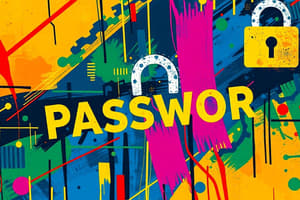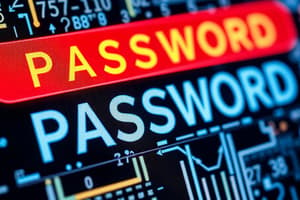Podcast
Questions and Answers
What is the primary reason strong passwords are essential for cybersecurity?
What is the primary reason strong passwords are essential for cybersecurity?
- They allow for faster account access
- They reduce the risk of hacking, phishing, and social engineering (correct)
- They can be reused across different accounts
- They are easy to remember
Weak passwords can be easily exploited by hackers.
Weak passwords can be easily exploited by hackers.
True (A)
Name one key threat that strong passwords help mitigate.
Name one key threat that strong passwords help mitigate.
Hacking
Using unique passwords for different sites can help keep your accounts secure even if one password is __________.
Using unique passwords for different sites can help keep your accounts secure even if one password is __________.
Match the type of attack with how strong passwords help mitigate them:
Match the type of attack with how strong passwords help mitigate them:
Which of the following is NOT a recommended practice for creating a strong password?
Which of the following is NOT a recommended practice for creating a strong password?
A password that is at least 12 characters long is generally considered more secure.
A password that is at least 12 characters long is generally considered more secure.
What is a passphrase?
What is a passphrase?
A strong password should include a mix of uppercase letters, lowercase letters, numbers, and ________.
A strong password should include a mix of uppercase letters, lowercase letters, numbers, and ________.
Match the password practices with their descriptions:
Match the password practices with their descriptions:
Which of the following is a benefit of using a password manager?
Which of the following is a benefit of using a password manager?
Strong passwords can help prevent unauthorized access to online banking accounts.
Strong passwords can help prevent unauthorized access to online banking accounts.
What are two common characteristics of weak passwords?
What are two common characteristics of weak passwords?
Using _____ passwords for different accounts minimizes the risk of multiple accounts being compromised.
Using _____ passwords for different accounts minimizes the risk of multiple accounts being compromised.
Match the type of account with its corresponding risk of weak passwords:
Match the type of account with its corresponding risk of weak passwords:
What is one characteristic of a strong password?
What is one characteristic of a strong password?
Using the same password across multiple accounts increases your cybersecurity.
Using the same password across multiple accounts increases your cybersecurity.
Name a type of attack that strong passwords can help defend against.
Name a type of attack that strong passwords can help defend against.
To make passwords harder to guess, they should include a mix of letters, numbers, and __________.
To make passwords harder to guess, they should include a mix of letters, numbers, and __________.
Match the following password practices with their benefits:
Match the following password practices with their benefits:
Which of the following is the best practice to enhance password security?
Which of the following is the best practice to enhance password security?
Strong passwords can completely prevent phishing attacks.
Strong passwords can completely prevent phishing attacks.
What is a benefit of using unique passwords for different accounts?
What is a benefit of using unique passwords for different accounts?
A longer password is generally less secure than a shorter password.
A longer password is generally less secure than a shorter password.
What is a passphrase?
What is a passphrase?
A strong password should include a mix of uppercase letters, lowercase letters, numbers, and __________.
A strong password should include a mix of uppercase letters, lowercase letters, numbers, and __________.
Match the following best practices for creating strong passwords with their descriptions:
Match the following best practices for creating strong passwords with their descriptions:
What is the recommended minimum length for a strong password?
What is the recommended minimum length for a strong password?
A password manager can help in remembering multiple strong passwords.
A password manager can help in remembering multiple strong passwords.
What should you do if one of your passwords is compromised?
What should you do if one of your passwords is compromised?
Changing your passwords every __________ months is a recommended practice.
Changing your passwords every __________ months is a recommended practice.
Which of the following is NOT a good practice for creating strong passwords?
Which of the following is NOT a good practice for creating strong passwords?
Which of the following is an essential application of strong passwords?
Which of the following is an essential application of strong passwords?
Weak passwords can serve as an invitation to cybercriminals.
Weak passwords can serve as an invitation to cybercriminals.
What is one of the best practices for creating a strong password?
What is one of the best practices for creating a strong password?
Using unique passwords for different accounts can help ensure that if one password is compromised, the others remain __________.
Using unique passwords for different accounts can help ensure that if one password is compromised, the others remain __________.
Match the following types of accounts with their corresponding risk involved with weak passwords:
Match the following types of accounts with their corresponding risk involved with weak passwords:
Which of the following is a suggested characteristic of a strong password?
Which of the following is a suggested characteristic of a strong password?
Using the same password across multiple accounts enhances cybersecurity.
Using the same password across multiple accounts enhances cybersecurity.
What is one way to mitigate the risks associated with phishing attacks?
What is one way to mitigate the risks associated with phishing attacks?
To protect against social engineering, strong passwords should be __________.
To protect against social engineering, strong passwords should be __________.
Match the cyber threat with its description:
Match the cyber threat with its description:
How often should passwords be updated to maintain security?
How often should passwords be updated to maintain security?
Strong passwords can prevent all types of cyber attacks.
Strong passwords can prevent all types of cyber attacks.
Which of the following is considered a strong password practice?
Which of the following is considered a strong password practice?
Strong passwords should be changed every 1-2 months.
Strong passwords should be changed every 1-2 months.
What is a passphrase?
What is a passphrase?
To enhance a base phrase, add numbers and special characters like _______ and _____.
To enhance a base phrase, add numbers and special characters like _______ and _____.
Match the password practice with its description:
Match the password practice with its description:
Which of the following is NOT a strong password characteristic?
Which of the following is NOT a strong password characteristic?
A password that combines both uppercase and lowercase letters can be enhanced by adding __________ and special characters.
A password that combines both uppercase and lowercase letters can be enhanced by adding __________ and special characters.
What is one way to test the strength of your password?
What is one way to test the strength of your password?
Passwords should be reused across different accounts for better memory.
Passwords should be reused across different accounts for better memory.
What is a recommended practice for creating passwords?
What is a recommended practice for creating passwords?
Flashcards are hidden until you start studying
Study Notes
Strong Passwords are Crucial for Cybersecurity
- Strong passwords are the first line of defense against various online threats, including hacking, phishing, and social engineering.
- Weak passwords can be easily exploited by hackers, leading to the compromise of personal information, financial data, and even identity theft.
Best Practices for Creating Strong Passwords
- Use a mix of characters: Combine uppercase and lowercase letters, numbers, and special symbols to make passwords harder to crack.
- Avoid common words and easily guessable information: Don't use common words, phrases, names, birthdates, or simple sequences.
- Ensure sufficient length: Aim for passwords that are at least 12 characters long. Longer passwords have more possible combinations.
- Use unique passwords for different accounts: Each account should have a distinct password to isolate risk. If one password is compromised, the others remain secure.
- Consider using a passphrase: A passphrase is a sequence of random words or a sentence that is easy to remember but difficult for others to guess.
- Regularly update your passwords: Change passwords periodically (every 3-6 months) to mitigate the risk of long-term exposure.
- Utilize a password manager: These tools can generate and store complex passwords, reducing the burden of remembering multiple strong passwords.
Step-by-Step Guide for Creating a Strong Password
- Start with a base phrase: Choose a meaningful phrase that's not easily guessable.
- Add Complexity: Enhance the phrase by adding numbers and special characters.
- Mix Uppercase and Lowercase Letters: Include both to further increase security.
- Ensure Sufficient Length: Aim for at least 12 characters.
- Use Unique Passwords: Modify the base phrase slightly for different accounts.
- Regularly Update: Change your passwords periodically.
- Test Your Password's Strength: Use online tools to assess its security.
- Utilize a Password Manager: These tools can help you manage complex passwords.
Applications of Strong Passwords
- Online Banking Accounts: Protect financial information from unauthorized access.
- Email Accounts: Prevent unauthorized access to email, which can lead to other compromised accounts.
- Social Media Profiles: Secure profiles from being hijacked, preventing identity theft and misuse of personal information.
- Work and Professional Accounts: Secure sensitive work-related data and communication.
- Online Shopping Accounts: Protect payment information and purchase history.
- Cloud Storage Services: Secure personal and professional files from unauthorized access and data breaches.
- Subscription Services: Secure accounts for streaming services, online courses, and other subscriptions.
- Healthcare Portals: Protect access to sensitive health information.
- Smart Home Devices: Secure smart devices and systems against unauthorized control and access.
- Gaming Accounts: Protect gaming profiles and in-game purchases from being compromised.
Impacts of Weak Passwords on Cybersecurity
- Weak passwords can be easily exploited by hackers, leading to data breaches and identity theft.
- Cyber attackers use techniques to crack weak passwords, including brute-force methods and dictionary attacks.
- High-profile data breaches often involve the exploitation of weak passwords, highlighting the importance of strong password practices.
- Compromised passwords can lead to the theft of personal identity and financial data.
- Cascading effects from a single weak password can compromise other accounts and aspects of an individual's digital life.
Key Takeaways of the Text
- Strong passwords are crucial for safeguarding online accounts and protecting sensitive information.
- Best practices for creating strong passwords include using a mix of characters, avoiding common words and phrases, ensuring sufficient length, using unique passwords, and regularly updating them.
- Utilizing password managers and following step-by-step guides can help users create and manage strong passwords.
- Weak passwords can lead to data breaches, identity theft, and significant financial losses.
- Implementing strong password practices is essential for enhancing cybersecurity and protecting individuals' digital identities.
Creating Strong Passwords
- Strong passwords are crucial in safeguarding online presence, serving as the first line of defense against cyber threats.
- Weak passwords can be easily exploited by hackers, putting personal information, financial data, and identity at risk.
- Hackers use sophisticated tools to crack passwords, breaking simple passwords in seconds.
- Phishing attacks trick individuals into revealing passwords by posing as legitimate entities.
- Social engineering attacks manipulate individuals into revealing confidential information.
Best Practices for Creating Strong Passwords
- Use a mix of uppercase and lowercase letters, numbers, and special characters (e.g., @, #, $, %).
- Avoid common words, phrases, or easily obtainable information such as names, birthdates, or simple sequences like "123456" or "password."
- Create passwords that are at least 12 characters long.
- Use unique passwords for each account.
- Consider using a passphrase, which is a sequence of random words or a sentence that is easy to remember but difficult for others to guess.
- Regularly update passwords every 3-6 months.
- Utilize a password manager to generate and store complex passwords.
Applications of Strong Passwords
- Strong passwords are essential for protecting online banking accounts, email accounts, social media profiles, work accounts, online shopping accounts, cloud storage services, subscription services, healthcare portals, smart home devices, and gaming accounts.
Weak Passwords and Cybersecurity
- Weak passwords contribute to data breaches by allowing cyber attackers to gain unauthorized access to sensitive information.
- Data breaches facilitated by weak password practices include the theft of personal identity, financial data, and other sensitive information.
- A compromised password can lead to the theft of an individual's identity, potentially affecting their digital and financial life.
Steps to Create a Strong Password
- Start with a base phrase that is meaningful but not easily guessable.
- Add complexity by including numbers and special characters.
- Mix uppercase and lowercase letters.
- Ensure the password is at least 12 characters long.
- Use unique passwords for different accounts.
- Regularly update passwords.
- Test password strength using online tools.
- Utilize a password manager.
Why Strong Passwords Are Crucial for Cybersecurity
- Strong passwords are the first line of defense against various cyber threats.
- Weak passwords are easily exploited by hackers, endangering personal information, financial data, and identity.
Key Threats Mitigated by Strong Passwords
- Hacking: Hackers use sophisticated tools to crack weak passwords.
- Phishing: Phishing attacks trick users into revealing their passwords by posing as legitimate entities.
- Social Engineering: Social engineering attacks manipulate individuals into divulging confidential information.
Best Practices for Creating Strong Passwords
- Mix of Characters: Combine uppercase and lowercase letters, numbers, and special symbols for complexity.
- Avoid Common Words and Guessable Information: Do not use common words, phrases, or easily obtainable information like names or birthdates.
- Sufficient Length: Aim for at least 12 characters. Longer passwords are more secure.
- Unique Passwords: Use distinct passwords for each account.
- Passphrases: Use a sequence of random words or a memorable sentence.
- Regular Updates: Change passwords periodically (every 3-6 months).
- Password Manager: Use a password manager to generate and store complex passwords.
Step-by-Step Guide to Creating a Strong Password
- Brainstorm a Base Phrase: Choose a meaningful, non-guessable phrase.
- Add Complexity with Symbols and Numbers: Enhance the phrase by adding numbers and special characters.
- Mix Uppercase and Lowercase Letters: Include both for increased security.
- Ensure Sufficient Length: Aim for at least 12 characters.
- Use Unique Passwords: Avoid reusing passwords.
- Regularly Update Passwords: Change them periodically.
- Test Password Strength: Use online tools to assess password security.
- Utilize a Password Manager: Generate and store complex passwords.
Applications of Strong Passwords
- Online Banking Accounts
- Email Accounts
- Social Media Profiles
- Work and Professional Accounts
- Online Shopping Accounts
- Cloud Storage Services
- Subscription Services
- Healthcare Portals
- Smart Home Devices
- Gaming Accounts
Reflecting on the Impact of Weak Passwords on Cybersecurity
- Weak passwords make data breaches more likely.
- Cyber attackers exploit weak passwords to gain unauthorized access to sensitive information.
- Compromised passwords can lead to identity theft.
Summary and Next Steps
- Strong passwords are the first line of defense against online threats.
- Follow best practices for creating robust passwords.
- Practice creating strong passwords to solidify your understanding.
- Stay vigilant against potential threats.
Studying That Suits You
Use AI to generate personalized quizzes and flashcards to suit your learning preferences.




